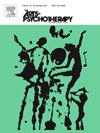The expressive therapies continuum and mentalization-based art therapy for individuals diagnosed with a cluster B/C personality disorder: A successful marriage!
IF 1.5
3区 心理学
Q3 PSYCHOLOGY, CLINICAL
引用次数: 0
Abstract
The Expressive Therapies Continuum (ETC) is increasingly used in various art therapy practices, including Mentalization-Based Art Therapy. However, there is little empirical evidence about the mechanisms of change and therapeutic factors of the ETC. In this study, ten respondents were interviewed to explore whether patients with a cluster B or C personality disorder consider psychoeducation about the ETC beneficial to their mentalizing capacity. The Grounded Theory Approach was applied to collect and analyse data, main categories were formed from the data and merged into a theory. According to the respondents, knowledge about the structure offered by the ETC contributed to increasing insight, providing alternative options, improving emotion regulation and increasing autonomy. This study is an exploration of the mechanisms of change and therapeutic factors of the ETC used as psychoeducational theoretical framework. Given the size and the evidential value of this study, further research is recommended.
针对被诊断为 B/C 群人格障碍患者的连续性表达疗法和基于精神化的艺术疗法:成功的结合!
表现疗法连续体(ETC)越来越多地被用于各种艺术治疗实践中,包括基于心理化的艺术治疗。然而,有关 ETC 的变化机制和治疗因素的实证证据却很少。本研究对十位受访者进行了访谈,以探讨 B 群或 C 群人格障碍患者是否认为有关 ETC 的心理教育对其心智化能力有益。本研究采用了基础理论方法来收集和分析数据,并从数据中归纳出主要类别,合并成理论。受访者认为,了解 ETC 提供的结构有助于提高洞察力、提供替代选择、改善情绪调节和增强自主性。本研究是对作为心理教育理论框架的 ETC 的变化机制和治疗因素的探索。鉴于本研究的规模和证据价值,建议开展进一步研究。
本文章由计算机程序翻译,如有差异,请以英文原文为准。
求助全文
约1分钟内获得全文
求助全文
来源期刊

Arts in Psychotherapy
Multiple-
CiteScore
3.20
自引率
11.10%
发文量
66
期刊介绍:
The Arts in Psychotherapy is a dynamic, contemporary journal publishing evidence-based research, expert opinion, theoretical positions, and case material on a wide range of topics intersecting the fields of mental health and creative arts therapies. It is an international peer-reviewed journal publishing 5 issues annually. Papers are welcomed from researchers and practitioners in the fields of art, dance/movement, drama, music, and poetry psychotherapy, as well as expressive and creative arts therapy, neuroscience, psychiatry, education, allied health, and psychology that aim to engage high level theoretical concepts with the rigor of professional practice. The journal welcomes contributions that present new and emergent knowledge about the role of the arts in healthcare, and engage a critical discourse relevant to an international readership that can inform the development of new services and the refinement of existing policies and practices. There is no restriction on research methods and review papers are welcome. From time to time the journal publishes special issues on topics warranting a distinctive focus relevant to the stated goals and scope of the publication.
 求助内容:
求助内容: 应助结果提醒方式:
应助结果提醒方式:


